How AI is Revolutionizing HVACR Contracting
Imagine a world where you reach out to your customer when their air conditioner is almost ready to break down before they even know there’s an issue, because AI has been trained on air flow, duct sizing, and other items that typically are precursors to breakdowns.
Think we’re still years away from this? Think again. This isn't science fiction anymore; it's the reality that Artificial Intelligence (AI) is bringing to the trades, including HVAC, plumbing, and electrical work.
This is just one of many examples that we’re going to dive into.
AI vs. Machine Learning: What's the Difference?
First things first, let's clear up some confusion. AI and Machine Learning are like ice cream and chocolate syrup. AI is the broad concept of machines being smart, like robots thinking and learning.
Think of Artificial Intelligence as a vast library filled with all kinds of books (knowledge and capabilities). Within this library, there's a special section dedicated to Machine Learning. This section is like a group of books that constantly update themselves based on what readers are currently interested in.
While the entire library (AI) offers a broad range of knowledge and applications, the self-updating books (Machine Learning) specialize in learning from new data and improving over time.
Just like a library is more than just its self-updating books, AI encompasses much more than just Machine Learning, but these books are a crucial and dynamic part of the whole.
The AI technology you see today, such as ChatGPT, has been trained by millions of data points that humans have provided over the years through content, books, and other resources.
Most of the current technology can learn from this content and answer questions or help you perform tasks in a small fraction of the time it would take a human to research, develop, and write or come up with a solution as these are processed by super computers and the tasks take mere-seconds to accomplish.
The Rise of AI in Contracting
With the COVID boom that the trades experienced, the wave of investment money that has flooded into the trades has put us in a position we are not typically in: at the forefront of technological advances.
In the trades, we're seeing more and more AI tools and use cases. It's changing how we do business, making things faster and smarter. For example, AI can schedule appointments, answer customer questions, and even help technicians diagnose problems. AI can also provide real-time feedback about your technician’s in-home sales process and performance or can summarize your CSR’s calls and provide on the spot coaching within minutes.
AI in Customer Service: A Game Changer
AI is also transforming customer service. Customer service is a broad term for your customer’s entire journey with your customer, meaning your office and field staff all play a part and there are specific tools for various use cases.
Avoca AI, for example, can answer your weekend and after-hours calls using AI voice technology that is nearly indistinguishable from a human’s voice. They can also answer web chats and text messages as well.
Sera™ uses AI to dispatch the best technician based on the technician’s skill set, location, and schedule for the rest of the day allowing your team to work smarter, spend more time focused on the current customer’s needs, and more profitably schedule the highest priority jobs first.
Another example, is Rilla. Rilla uses your technician’s smart phone to record the in-home conversations between your Technician and Homeowners and essentially replace ride-alongs, freeing up your Service Manager’s time, so they can coach a large team of Technicians quickly and right after each service call.
Marketing Gets Smarter with AI
AI is not just fixing your customer service department; it's helping to spread the word too. It can create social media posts, write blog articles, and even design email campaigns.
While we don’t have any tool recommendations currently, here’s what we recommend.
1. Make sure you’re on the paid version of ChatGPT.
2. Upload as much information into ChatGPT’s memory as you can. This can be things such as branding information, core values, your history as a business, your team, what makes you and your business unique, and more.
3. Once you upload this information one time, all of the outputs you have with ChatGPT will improve. By uploading this info, you are training your own AI brain, if you will.
4. Now, when you ask it to write an email or create a social media post, the content will align with your brand and identity and you won’t have to add that information in every single time.
Why Prompt Engineering is Important
Prompt Engineering is a fancy term, but it's simple. It's about teaching AI how to respond to different situations.
For example, if a customer is unhappy, AI needs to know what to ask to help fix the problem. This skill is crucial for AI to work well in our businesses.
Communication skills, while already important in growing a great team, are super important.
One of the best tips I can provide is to ask the AI what information would be valuable to provide it, which usually prompts the AI to send you a list of questions it would like to see, making your job of providing useful information easier.
Training Technicians with AI
AI isn't replacing technicians; it's enhancing them and making it easier to get new Technicians on the road more quickly.
Interplay Learning, already an industry leader in virtual reality training for home services, for example, has created SAM, short for Skill Advisor and Mentor. SAM takes all the trainings and interacts back and forth with your Technicians on diagnoses and skill-related improvement using the Socratic learning method.
Bluon’s MasterMechanic is another AI tool that assists techs in diagnosing and solving problems on the job. Bluon has taken over 50,000 live tech support calls and trained their AI based on those calls into an easy to use chat interface.
The goal of the master mechanic is for those quick tech-related questions to be able to leverage the thousands of pre-recorded calls to get your answers accurately and more quickly.
AI in Data Analysis and Maintenance
AI is also a whiz at analyzing data. It can predict when equipment might fail and suggest maintenance, saving time and money.
There are several newer tools on the market that are focused on predictive maintenance, keeping the Contractor top of mind when a customer’s HVAC system starts underperforming, so that hard-earned customer doesn’t go back to Google to find a new Contractor.
AC Monitor uses AI learning and data from smart thermostats to analyze and predict when your customer’s HVAC system is on the fritz, allowing you to alert your customer and schedule a service call.
If you have business questions related to your marketing, sales, or financial departments, simply upload a CSV file of that data and start asking the AI questions about your data, so you can find areas of improvement.
We did this at Relentless Digital to reverse engineer how many leads we needed to bring in each month to fill our sales targets.
We also used some of our client’s call tracking performance data to highlight weak areas and suggest how they can increase their call taking team’s performance.
Facing the Challenges of AI
Of course, AI isn't perfect. There are challenges like the cost of new technology, training people to use it, and the fear of job loss.
This technology isn’t a fad, but will be similar to previous economic-related revolutions, such as when internet came about, email, and smart phones.
The new norm will be mixing AI with human intelligence and blending the power and speed of AI, but the ingenuity and creativeness of humans.
New highs in terms of what is possible are absolutely possible with this technology and we highly recommend you begin (if you haven’t already) the process of learning how this can impact your business.
Seamless Integration with Existing Systems
Incorporating AI into existing systems is a critical step for HVAC businesses looking to modernize without disrupting their current operations. AI technologies, designed with flexibility in mind, can seamlessly integrate with established software and workflows, enhancing efficiency without the need for a complete overhaul.
If your software doesn’t have AI built into it, Zapier is a great resource to help bridge the gap between softwares allowing them to talk to one another and share data back and forth. This integration allows for more accurate diagnostics, streamlined appointment scheduling, and smarter resource management, all while using familiar interfaces and processes.
By integrating AI, businesses can achieve a balance between innovative technology and trusted methods, ensuring a smoother transition for staff and a consistent experience for customers.
Ethical Considerations and Data Privacy in AI Implementation
On the ethical side, as AI delves into data analysis, HVAC businesses must prioritize data privacy and ethical considerations. The responsibility lies in implementing AI solutions that not only comply with data protection regulations but also maintain customer trust.
This involves transparent data handling practices, securing customer information, and using data responsibly to improve services. Addressing these ethical concerns head-on not only safeguards the business against legal complications but also strengthens its reputation in an industry where customer trust is paramount.
By thoughtfully integrating AI and upholding ethical standards, HVAC companies can lead the way in a tech-forward, responsible future.
The Future is NOW
The integration of AI into the contracting trades is not just a futuristic concept; it’s a present-day reality reshaping our industry. From enhancing customer service with intelligent virtual assistants to empowering technicians with sophisticated diagnostic tools, AI is proving to be a game-changer.
It's facilitating smarter marketing strategies, driving efficiency, and fostering predictive maintenance, ultimately leading to unparalleled service quality and business growth.
As we navigate this AI-driven landscape, it’s crucial to balance technological innovation with ethical considerations and personal touch. By doing so, we're not merely adapting to a trend; we're actively participating in a transformative movement that’s redefining our trade and setting new standards for the future.
In embracing AI, we are not just repairing systems; we're building a smarter, more connected, and more efficient trade for everyone involved.
David “Tersh” Blissett and Joshua Crouch are at the forefront of heating, ventilation, air conditioning and refrigeration contracting podcasting.
Tersh Blissett operates two HVAC businesses based in Georgia, Service Emperor HVAC, Plumbing & Electrical and TriStar Heating, Air Conditioning, Plumbing & Electrical. Tersh can be found online at www/Tersh.co.
Joshua Crouch is Master of Digital Marketing at Relentless Digital, based on a decade of diverse experiences in the home services industry, particularly in HVAC.
Tersh and Josh produce the 'Business Success Mastery' podcast, and were named 2023 Podcasters of the Year by HVAC Tactical. Find their podcast at servicebusinessmastery.com.
About the Author
Tersh Blissett
Business owner, Podcaster
David "Tersh" Blissett operates two HVAC businesses based in Georgia, Service Emperor HVAC, Plumbing & Electrical and TriStar Heating, Air Conditioning, Plumbing & Electrical. Tersh can be found online at www/Tersh.co.
Tersh and Joshua Crouch produce the "Business Success Mastery" Podcast, which can be found at servicebusinessmastery.com.

Joshua Crouch
Master of Digital Marketing
Joshua Crouch is Master of Digital Marketing at Relentless Digital, based on a decade of diverse experiences in the home services industry, particularly in HVAC. Relentless Digital provides marketing solutions for HVAC, plumbing and electrical contractors. Find him at https://www.relentless-digital.com/.
Joshua and David "Tersh" Blissett -- produce the "Business Success Mastery" podcast, and were named 2023 Podcasters of the Year by HVAC Tactical. Find their podcast at servicebusinessmastery.com.

